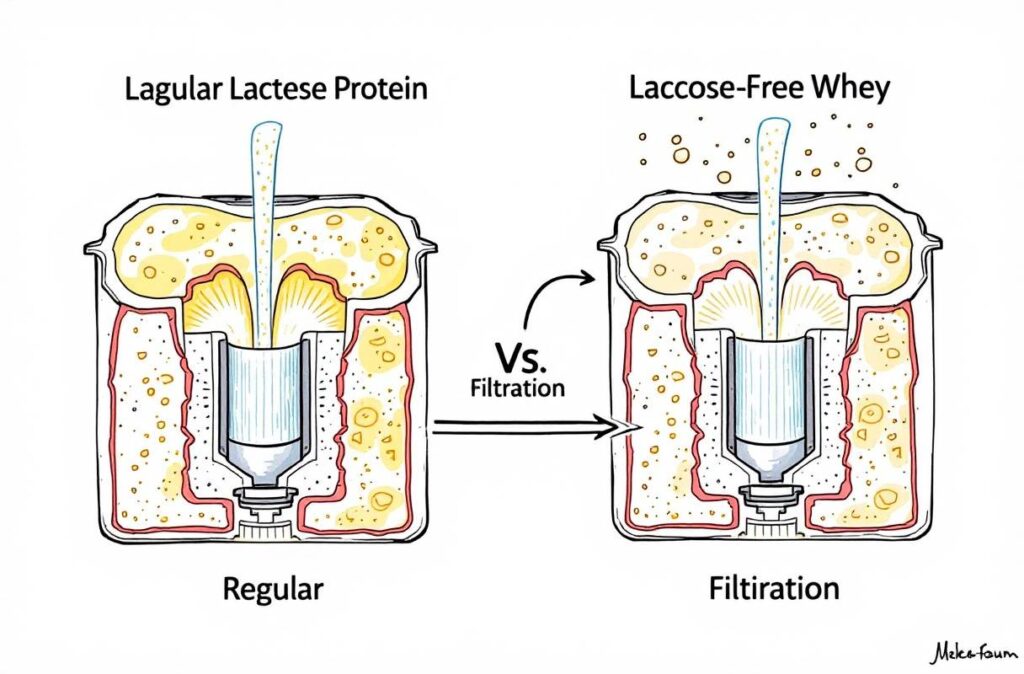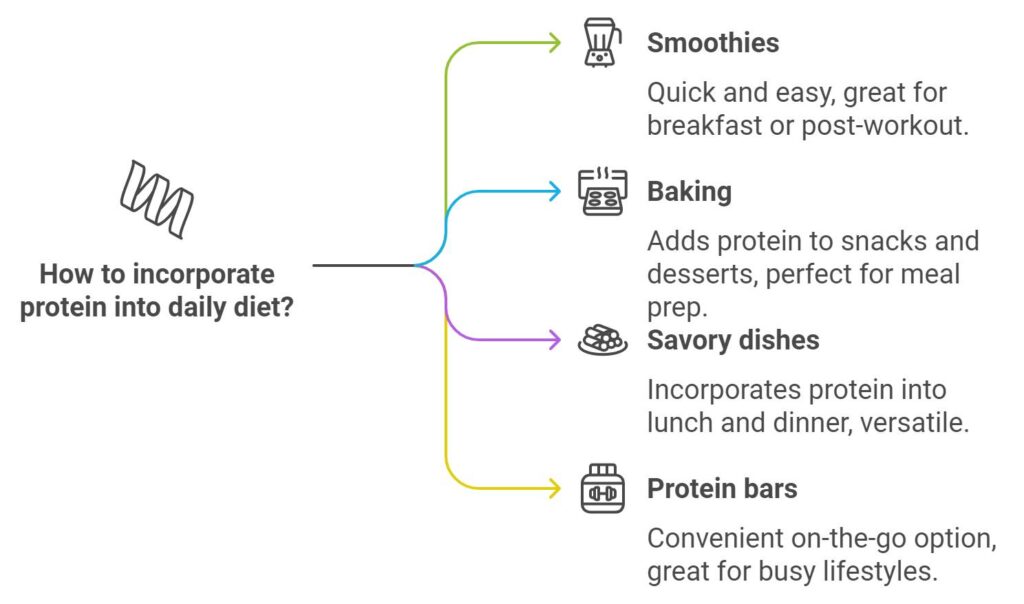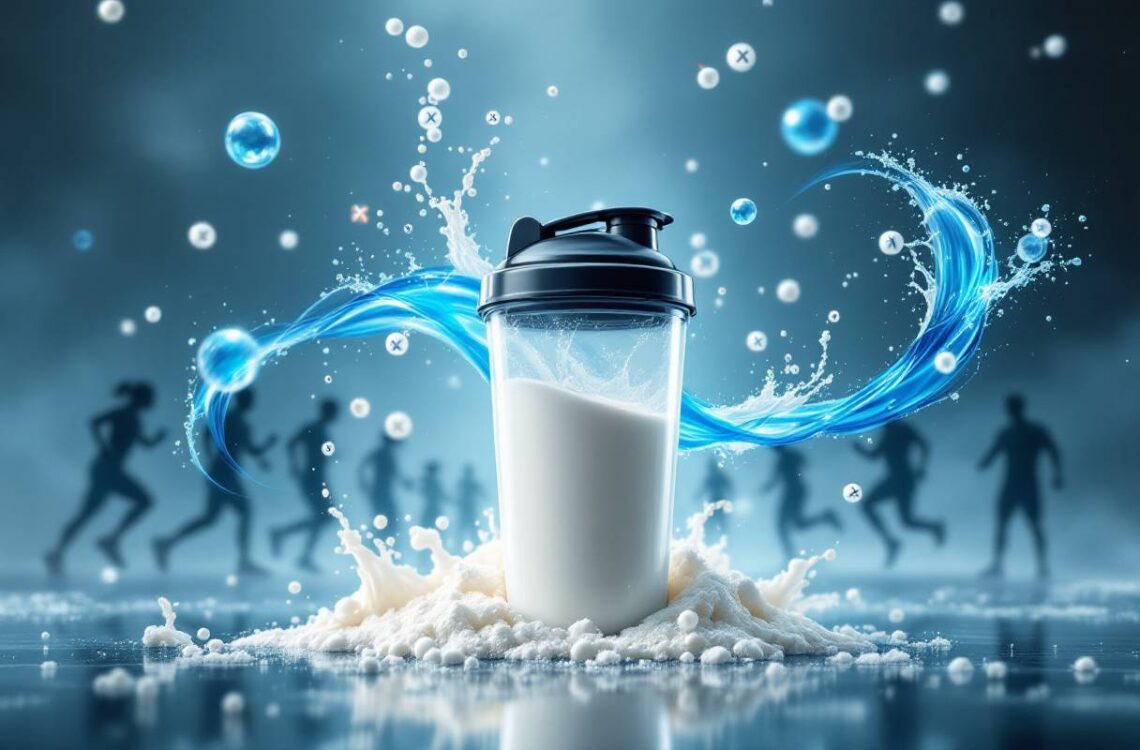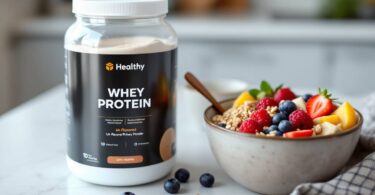Are you ready to unlock your body’s full potential without the digestive drama?
Welcome to the world of lactose-free whey protein – the game-changing supplement that’s revolutionizing how we think about protein intake.
Whether you’re a dedicated athlete, a casual gym-goer, or someone who can’t tolerate lactose, this powerful protein variant offers all the muscle-building benefits of traditional whey without the stomach upset. But here’s the exciting part: it’s not just about avoiding discomfort – it’s about optimizing your body’s performance and recovery in ways you never thought possible.
Ready to discover how this dairy-derived superhero could transform your fitness journey? Let’s dive into the science and benefits of lactose-free whey protein and uncover why it might be the missing piece in your nutrition puzzle.
Tapping into the Magic of Protein
Why Protein Rocks for Top Performance
Protein’s your body’s best buddy when it comes to keeping everything working smoothly, especially if you’re gunning for that fitness high score. Think of it as the building blocks for muscles, crucial for anyone lifting weights, running marathons, or simply staying active. When you work out, muscles get tiny tears. Protein is like the construction crew that swoops in to repair and strengthen them, making you stronger bit by bit.
How much protein do you need? Hey, it depends on your lifestyle. Here’s a cheat sheet:
| Group | Protein You Need (grams per kg of body weight) |
|---|---|
| Couch Potatoes | 0.8 |
| Runners and Cyclists | 1.2 – 1.4 |
| Weight Lifters | 1.6 – 1.8 |
| Older Folks | 1.0 – 1.2 |
For the fit-focused or the wise elders, getting enough protein helps keep your muscles strong, fills you up so you’re not constantly raiding the fridge, and keeps you healthy overall. As you age, muscles can fade, so older adults need a bit more protein to keep things in check.

Protein isn’t just about building muscle; it’s the cornerstone of athletic performance and recovery. The advent of lactose-free options has made high-quality protein accessible to everyone.”
Dr. Stuart Phillips, Professor of Kinesiology at McMaster University
The Lowdown on Lactose-Free Whey Protein
Whey protein is a crowd favorite if you’re hunting for quick protein punches—full of all the good stuff like amino acids that bodies crave. But if lactose makes your stomach turn, regular whey might be a no-go.
Enter lactose-free whey protein, hero without the digestive drama. It ditches the lactose but keeps all the muscle-boosting benefits. The secret? A nifty filtering process that makes it friendly for more folks.
Who should give lactose-free whey a whirl?
- Gym lovers and muscle builders
- Athletes upping their game and bounce-back speed
- Health buffs boosting daily protein power
- Dairy-loving vegetarians
- Older adults stuck fighting the muscle loss battle
If you’re curious about how whey types stack up, take a peek at our whey isolate vs concentrate showdown.
Adding this superhero to your diet is a cinch. Mix it into your morning smoothie, shake it up post-gym, or sneak it into meals. We have some killer ideas over in our cooking with whey protein guide and whey protein smoothie recipes page.
This top-tier protein helps repair muscles, can keep your weight in check, and sticks with you when hunger hits. For those dipping their toes in the protein world, our whey protein guide has the scoop you need.
Choosing lactose-free whey means getting your protein fix without worrying about tummy trouble. It’s your trusty sidekick on the road to fitness and health greatness.
Who Can Benefit from Lactose-Free Whey Protein

Fitness Enthusiasts and Bodybuilders
Got a passion for pumping iron or sculpting those biceps? Fitness enthusiasts and bodybuilders thrive on muscle growth and recovery. Lactose-free whey protein serves up a high-quality protein punch minus the stomach-aching backlash that lactose delivers. It’s the secret sauce to muscle-making and a faster rebound after a workout. Wanna get swole like a boss? Check out our whey protein guide.
Athletes Improving Performance and Recovery
For athletes chasing that next best personal record, what goes into your body is just as critical as your training. Lactose-free whey protein, packed with those must-have amino acids, is the trick for refueling muscles and cutting down recovery time. Curious about the behind-the-scenes of protein kinetics? Swing by whey protein absorption.
| Benefit | Lactose-Free Whey Protein |
|---|---|
| Essential Amino Acids | High |
| Digestive Ease | You Bet |
| Muscle Recovery | Top-Notch |
Health-Conscious Individuals Seeking Protein Intake
If you’re the kind of person who reads food labels like novels, lactose-free whey protein should be your next bestseller. It delivers a dose of high protein without causing a ruckus in your gut. Perfect for those who are stepping up their protein game. Shake up your routine with some tasty whey protein smoothie recipes.
Vegetarians Incorporating Dairy
Hey there, dairy-loving vegetarians looking to up your protein without the moo-lly distress. Lactose-free whey protein packs all the necessary amino acids, checking off those nutritional boxes. This is your ticket to a worry-free protein source. Looking for more protein options? Take a peek at choose whey protein.
Older Adults Maintaining Muscle Mass
For the wise among us, keeping that muscle humming is key for bouncing around and overall health. Lactose-free whey protein makes for an easy-to-digest, top-quality protein, supporting muscle upkeep and wellness. Explore why this protein is a must-have for maintaining muscle in golden years at whey protein lean muscle.
| Benefit | Lactose-Free Whey Protein |
|---|---|
| Muscle Maintenance | Top Tier |
| Digestive Tolerance | High-Five |
| Overall Wellness | Thumbs Up |
These folks all stand to gain from adding lactose-free whey protein to their lifestyle. Aiming for muscle development, performance enhancement, gut-friendly nutrition, or strength in later years—this protein variant hits the mark every time. For tips on tailoring your intake, check out our whey protein dosage.
Understanding Lactose-Free Whey Protein
Lactose-free whey protein is a solid choice for anyone who’s dodging lactose. Whether you’re lactose intolerant or just looking to skip it, this kind of protein provides the same muscle-boosting benefits as the regular stuff but without any tummy upset drama.

“The development of lactose-free whey protein represents a significant breakthrough in sports nutrition, allowing athletes with lactose intolerance to benefit from whey’s superior amino acid profile and rapid absorption.”
Dr. Jose Antonio, CEO of the International Society of Sports Nutrition
What Makes Whey Protein Lactose-Free
Lactose-free whey gets its title thanks to some clever processes that strip out the lactose. Here’s the lowdown:
- Ultrafiltration: Think of it as a clever sieve. It uses a kind of membrane to keep the good stuff—read: protein—while saying goodbye to lactose. What’s left is whey with much less lactose.
- Lactase Treatment: This involves chucking in some lactase enzyme, which breaks lactose into sugars your belly will love, like glucose and galactose.
With these nifty tricks, you get a protein that won’t have the lactose intolerant clutching their stomachs.
Nutritional Benefits of Lactose-Free Whey Protein
Lactose-free whey protein packs the same punch as its milkier sibling. It’s a top-notch source of protein deliciousness for folks with fitness goals. Check out its perks:
- Loaded with Protein: Each scoop is protein-rich, just what you need for repairing and growing those muscles.
- Full of BCAAs: Those are Branched-Chain Amino Acids, the unsung heroes for muscle healing and cutting down on any workout wear and tear.
- Minimal Carbs and Fats: It’s low on those extras like carbs and fats, helping keep your diet lean and mean.
- Quick to Absorb: Your body soaks it up fast, making it just the thing for bouncing back after a sweaty session.
| Nutrient | Amount per Serving (30g) |
|---|---|
| Protein | 24g |
| Carbohydrates | 2g |
| Fats | 1g |
| Calories | 110 |
| BCAAs | 5g |
Check out our whey protein guide for more info on how this protein stuff works and why it’s so awesome.
This lactose-free sidekick is ideal for gym junkies, athletes, and anyone wanting to live the fit life. For a steer on picking the perfect whey protein, cruise over to our how to choose whey protein article.
Throwing lactose-free whey into your diet is super simple; think smoothies or even your cooking pot. For tasty inspiration, hit up our whey protein smoothie recipes and cooking with whey protein sections.
Usage and Incorporation
Carve a new groove in your fitness journey by adding lactose-free whey protein to your diet. This little powerhouse is a hit with fitness fans, athletes, and those keeping an eye on their health. Here’s your down-to-earth guide on how to slide it into your daily routine with flair.

Incorporating Lactose-Free Whey Protein into Your Diet
Lactose-free whey protein isn’t a one-trick pony. It’s flexible enough to jump into any part of your eating habits. Check out some popular ways to make it yours:
Smoothies and Shakes
- Toss some lactose-free whey protein into a blender with fruits, veggies, and something wet like almond milk or water, and you’ve got a health shake ready to roll.
- Add a scoop to your morning smoothie for a zip of protein that kicks off your day.
Baking and Cooking
- Stir it into the batter for muffins, pancakes, or homemade protein bars—get your bake on with a twist.
- Throw it in savory meals like soup or mashed potatoes. It sneaks in extra protein without much fuss.
Snacks and Treats
- Mix it with yogurt or cottage cheese for a snack with a giant dose of protein.
- Make energy balls with oats, nut butter, and a scoop of whey protein—snack time never had such a punch.
Here’s a quick chart showing what you might toss together:
| Use | Ingredients | Example |
|---|---|---|
| Smoothies | Fruits, Veggies, Almond Milk | Morning Smoothie |
| Baking | Flour, Eggs, Sweet Stuff | Protein Muffins |
| Snacks | Yogurt, Nutty Butter, Oats | Energy Balls |
For fresh ideas, peek at our whey protein smoothie recipes.
Optimizing Performance with Lactose-Free Whey Protein
To snag all the goodness lactose-free whey protein offers for better performance and quicker recovery, give these tips a whirl:
Timing and Dosage
- Down a scoop of whey protein about 30 minutes after your workout. Muscles love immediate care. More on that at when to take whey protein.
- Stick to the serving size sweet spot, usually 20–30 grams, to hit the protein mark without going overboard. Our piece on whey protein dosage tells you more.
Combining with Carbohydrates
- Pair whey protein with some carbs to refill those glycogen stores and help muscles bounce back. Think banana or oatmeal alongside your protein shake.
Hydration and Diet Balance
- Keep hydrated for smooth protein digestion and absorption. Get the scoop at whey protein absorption.
- Round out your meals with varied protein sources, mixing and matching along with your whey dose for full-on nutrition.
By dropping lactose-free whey protein into your snacks and mealtimes, and timing it around workouts, you’ll give recovery, muscle beefing up, and general health a boost. For more brain food, look through our articles on whey protein guide and whey protein for weight loss.
Making the Most of Lactose-Free Whey Protein
Enhancing Recovery
Lactose-free whey protein? It’s pretty much your best buddy post-workout. It swoops in like a superhero to patch up those muscle tears and kick muscle soreness to the curb. Bonus: if your stomach’s lactose-intolerant, this kind of whey protein lets you enjoy the perks without any tummy drama.
Want a killer post-workout shake? Mix up these bad boys:
- 1 scoop of lactose-free whey protein
- 1 banana
- 1 cup of almond milk
- 1 tablespoon of honey
- Blend it all up, and bottoms up!
Craving more yum ideas? Peep our whey protein smoothie recipes.
Promoting Muscle Growth
Building muscles? Lactose-free whey protein is your go-to. It’s loaded with essential amino acids—basically the muscle’s favorite snack. Sip a shake after pumping iron, and you’re fueling those muscle fibers to grow stronger over time.
| When You’re At | Shake Time | Protein Kick |
|---|---|---|
| Before Gym | 30 mins ahead | 20g |
| After Gym | Within an hour | 25g |
Want the 411 on timing your shakes just right? Stop by when to take whey protein.
Supporting Overall Health and Wellness
But wait, there’s more! Lactose-free whey does way more than just buff you up. It’s loaded with the vits and minerals that keep the whole body ticking. If you’re struggling to hit your protein goals, this can help.
Here’s how it has your back:
- Boosts immune power
- Strengthens bones
- Assists with managing weight
For the lowdown on folding whey protein into your life, don’t miss our whey protein guide, and the scoop on whey protein for women and whey protein gut health.
Get savvy with lactose-free whey protein, and you’ll be on top of recovery, muscle gains, and wellness. This protein fits your lifestyle like a glove, even if your diet has a few rules of its own.
Conclusion
Lactose-free whey protein stands out as a versatile and powerful ally in your fitness journey, offering all the benefits of traditional whey without the digestive concerns.
Whether you’re building muscle, improving athletic performance, or simply maintaining overall health, this supplement adapts to your unique needs while supporting your body’s protein requirements. Remember, success lies not just in choosing the right protein, but in how you use it – timing your intake, combining it with proper nutrition, and staying consistent with your routine. From smoothies to baked goods, the possibilities for incorporating this protein powerhouse into your daily life are endless.
Ready to elevate your protein game? With lactose-free whey protein, you’re now equipped to achieve your fitness goals without compromise – because performance shouldn’t come with side effects.
FAQs
What makes lactose-free whey protein different from regular whey?
Lactose-free whey undergoes special filtration or enzyme treatment to remove lactose while maintaining all the protein benefits, making it suitable for lactose-intolerant individuals.
How much protein should I consume daily?
Daily protein needs vary: 0.8g/kg for sedentary adults, 1.2-1.4g/kg for endurance athletes, and 1.6-1.8g/kg for strength training. Consult with a healthcare provider for personalized recommendations.
When is the best time to take lactose-free whey protein?
The optimal times are within 30 minutes after workouts, first thing in the morning, or between meals. For muscle building, consider taking it before bed.
Can lactose-free whey protein help with weight loss?
Yes, it can support weight loss by increasing satiety, preserving lean muscle mass during caloric restriction, and boosting metabolism.
How can I incorporate lactose-free whey protein into my diet?
Add it to smoothies, baked goods, oatmeal, or simply mix with water or plant-based milk. Get creative with recipes while maintaining proper dosage.
Additional Resources
International Society of Sports Nutrition Position Stand https://jissn.biomedcentral.com/articles/10.1186/s12970-017-0177-8
Mayo Clinic: Lactose Intolerance
https://www.mayoclinic.org/diseases-conditions/lactose-intolerance/symptoms-causes/syc-20374232
Academy of Nutrition and Dietetics: Sports Nutrition
https://www.eatright.org/fitness/sports-and-performance/fueling-your-workout/protein-and-the-athlete




